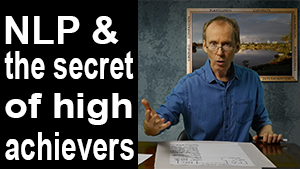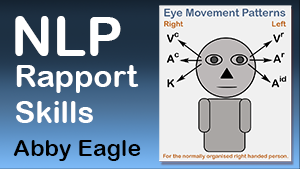
Learn how to set goals in a way that makes them more likely to be achieved by using the Neuro Linguistic Programming (NLP) Well-Formed Outcome questions. Phone 07 5562 5718 or send an email to book a free 20 minute telephone or Skype session with Abby Eagle. Learn to set goals using NLP then commit 100% to do whatever is necessary in order to achieve the outcome. NLP online and phone coaching available. NLP Coaching, Hypnotherapy and Meditation, Gold Coast, Robina. See also the article "A Solution for the Motivated Underachiever".
The NLP Well Formed Outcome Questions: How to Set Goals in a Way That Make Them More Likely to be Achieved

NLP is a model of applied psychology that has its focus on achieving results. Rather than explore the past the NLP Coach will put their efforts into building a well formed outcome and then help the client access and mobilise their resources towards achieving the outcome. The well formed outcome frame can be used in a wide range of contexts.
Watch the Video: How to Set a Goal using the WFO Questions
Click the Image to Watch on YouTube
NLP Well Formed Outcome Questions
Preframes
WHAT
Present state to desired outcome. P/S - D/O.
1. What is the desired outcome? Stated in the positive.
2. What will the outcome look like, sound like and feel like?CONTEXTS
3. When?
4. Where?
5. With whom?PURPOSE
6. Why? Purpose? Intention?
PROCESSES / HOW
7. Do you know what to do?
8. Is it self initiated and maintained?
9. Can you do it?
10. Have you done this before?
11. Do you know the steps and stages?
12. Do you have an action plan?
13. Do you have a way to monitor your progress?
14. Do you have a way to deal with interferences?
15. Do you have the resources? Internal & external.CHECKS
16. Ecology? Are you in alignment within yourself?
17. Why do you want it? Is it compelling?
18. Have you made a decision?
19. What will be the evidence, the convincer that lets you know that you have achieved the outcome?What are immediate tasks you need to take action on?
What are you learning?
End frames
How to use the well formed outcome questions
Preframes
Beginning the conversation with a preframe helps to define the context, topic and purpose for the discussion. For example, every staff meeting should have an agreed upon agenda and a set of conditions for how the meeting should be held. In a personal relationship it can be useful to set frames for a discussion or activity as a way to mark it out from other activities. In an NLP Coaching session I use the following preframe: "This session is an opportunity for you to make some changes. To that end I will be asking you a lot of questions designed to help you to access and mobilise your inner resources towards you achieving your desired outcome. At times I may interrupt you and I do that in the service of you."
WHAT
Present State - Desired Outcome (P/S - D/O)
The first step is to spend a 'few minutes' establishing the present situation. In some cases it may be useful to set up a test so that the client will know when the problem is 'fixed' and they have achieved their desired outcome.
1. What?
What do you want? What else do you want? The desired outcome needs to be stated in the positive. Use words that are positive to your desired outcome, not what you don't want.
2. VAK
In sensory specific terms what will you see, hear and feel when you get the outcome? What will you look like, sound like and feel like when you get the outcome? Build a vivid story board in your mind in much the same way a film director would do. The outcome needs to be measurable in some way. How will you know when you have got the outcome? This is also the evidence procedure.
CONTEXTS
3. When?
When do you want the outcome? What date specifically? Is that date realistic? Does it fit in with everything else that you need to do, and want to do?
4. Where?
Where do you want the outcome? In what context/situation do you want the outcome? Where will the outcome not occur?
5. With whom?
With whom do you want the outcome? Who else do you need to involve (or will be involved) in achieving the outcome?
Proactive goal setting.
Proactive goal setting refers to a process in which you orient the client to having successfully achieved the outcome and then take them further out into the future such that they get the feeling of conviction for having achieved the outcome.
PURPOSE
6. Why? Purpose? Intention?
Why do you want the outcome? For what purpose do you want the outcome? Having that will allow you to have, get or experience what? Chunk up to the highest intention.
What values does working towards the outcome and achieving the outcome fulfil? What does having the desired outcome mean to you? Is there enough meaning associated with each of the values for the outcome to be compelling?
How will you feel when you get your outcome? Is that something that you really want? Once you experience that value/emotion what will you then get to experience? Chunk up to get the highest intention for the outcome?
PROCESSES / HOW
7. Do you know what to do?
Do you know what to do to get the outcome? What actions do you need to take?
8. Is it self initiated and maintained.
Is it in your power to initiate and follow through on the action steps to achieve the outcome? Does achieving the outcome rely upon some external variable such as luck or another person? Who do you need to be to initiate the processes and behaviours, and maintain them over time?
9. Can you do it?
Are you capable of doing the actions? Are you competent with the skill? Are you competent in that area?
10. Have you done this before?
Have you attempted to achieve this goal before? If so, when and what happened? In that previous attempt what worked and what did not work?
11. Do you know the steps and stages.
Do you know the steps and stages, the details, the action steps that you need to take? Chunk the actions into a sequence of manageable steps. Chunking and sequencing. Have you defined each step? Have you defined each milestone of success in sensory based terms? Have you kept the steps simple or have you over complicated matters? Can you delete any of those steps and still achieve the desired outcome?
12. Do you have an action plan.
Do you have a written action plan? Is it clear, precise and understandable by others? What is your strategy for carrying out the required actions?
13. Do you have a way to monitor the progress?
Do you have a system in place to monitor your progress towards achieving milestones on the way to achieving the outcome? A way to check the feedback? Who provides the feedback? At what times and for what behaviours? What criteria will determine the feedback?
14. Do you have a way to deal with interferences?
Is there anything or anyone that may stop you from achieving the outcome? Any blocks, obstacles or sabotages - either internal or external? Any reason why you might not want to get the outcome? What will you gain - what will you lose?
15. Do you have the resources? Internal and external.
Do you know who you need to be to achieve the outcome? Do you have the internal resources? (identity, attitude, values, beliefs, frames of mind, strategies.) Do you have what it takes?
Do you have the external resources to complete each step? (Money, time, people.)
Do you know who is the best person for the job and where to find that person?
CHECKS
16. Ecology? Are you in alignment within yourself?
Is the outcome balanced and ecological for all areas of your life? Is it ecological for your health, relationships, values, finances, business and career? Is it ecological in the market place, in your local community, for the world and the environment?
Does the desired outcome lie within the realm of what is possible for you? Is it reasonable? Is it realistic? Do you feel a sense of congruency and commitment to work towards the outcome? Are you totally in alignment with doing whatever it takes to achieve the desired outcome? Could working towards the goal cause any problems or conflict for you and others?
17. Is it compelling? Why?
After thinking about the desired outcome from all angles is it still compelling? Knowing what it will take to achieve the outcome, do you still feel passionate about it? What motivates and inspires you to reach the goal?
18. Have you made a decision?
Are you going to commit to the outcome? How strong is the commitment? Is there anything else you need to think about before you commit to your decision to take action to achieve the outcome? Have you made the decision? How does it feel now that you have made the decision?
19. Evidence procedure / Convincer.
How will you know when you have achieved the outcome? How will you measure the outcome? A week, month, year from now, looking back to this day, what will you have experienced in your life that demonstrates to you that you have made significant progress?
Learning's
What are the most important learning's that you have got from working towards your outcome?
Tasks.
What are some tasks that you need to do straight away to demonstrate your commitment to working towards the desired outcome?
Bibliography: Coaching Conversations for Transformational Change - Meta Coaching Volume 11, L. Michael Hall Ph. D. with Michelle Duval and Robert Dilts. Neuro-Semantic Publications, USA, 2003. Acknowledgements to Terry McClendon.
Your contribution to this article is welcomed so please take a moment to leave your comments below. And if you are interested in NLP Coaching then please contact Abby Eagle using the contact form on this page.
Share With Friends
| DISCUSSION GROUPS | |
|---|---|
 |
|
| NLP Future Selfing | |
| NLP, Hypnotherapy & Meditation | |
| NLP Peace Mapping | |
| Facebook Discussion Group | |












